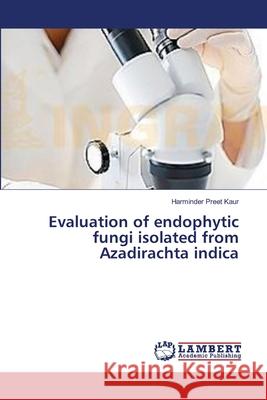Evaluation of endophytic fungi isolated from Azadirachta indica » książka
Evaluation of endophytic fungi isolated from Azadirachta indica
ISBN-13: 9783659629990 / Angielski / Miękka / 2014 / 204 str.
Spodoptera litura (Fabricius) (Lepidoptera: Noctuidae) is a polyphagous pest, causing economic losses to many of the crops in India and other countries. A large number of chemical insecticides are being used for the management of this pest. However, repeated use of synthetic organic insecticides has resulted in pest resurgence, pesticide resistance, lethal effects on non target organisms as well as negative impact on both environmental and human health. Hence, more and more emphasis is being given to ecofriendly strategies. Biological control as part of integrated pest management has been suggested as the most sustainable long term solution. Biological control of insect pests is specific, of low relative cost and low risk to ecosystem. Among the various microorganisms, endophytic fungi are known to impart resistance to host plants against various insect pests. Endophytic fungi colonize internally the plant tissues, especially leaves, branches, stems and roots without giving detrimental effect to the host plant. The mechanism underlying the anti-insect properties of endophytes is attributed to the various secondary metabolites produced by the fungi.
Spodoptera litura (Fabricius) (Lepidoptera: Noctuidae) is a polyphagous pest, causing economic losses to many of the crops in India and other countries. A large number of chemical insecticides are being used for the management of this pest. However, repeated use of synthetic organic insecticides has resulted in pest resurgence, pesticide resistance, lethal effects on non target organisms as well as negative impact on both environmental and human health. Hence, more and more emphasis is being given to ecofriendly strategies. Biological control as part of integrated pest management has been suggested as the most sustainable long term solution. Biological control of insect pests is specific, of low relative cost and low risk to ecosystem. Among the various microorganisms, endophytic fungi are known to impart resistance to host plants against various insect pests. Endophytic fungi colonize internally the plant tissues, especially leaves, branches, stems and roots without giving detrimental effect to the host plant. The mechanism underlying the anti-insect properties of endophytes is attributed to the various secondary metabolites produced by the fungi.











